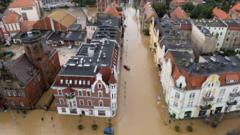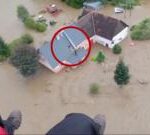The mayor of a Polish city has asked all 44,000 residents to evacuate, as widespread flooding continues to batter swathes of central Europe.
Nysa mayor Kordian Kolbiarz asked people to head for higher ground, citing the risk of an embankment breaching and releasing a cascade of water into the town from a nearby lake.
On Monday, the death toll from the floods that hit central Europe over the weekend continued to rise, with more casualties recorded in the Czech Republic, Poland and Austria.
Budapest said it would close roads near the river Danube which runs through the city, citing the risk of flooding later this week.
“Please evacuate your belongings, yourselves, your loved ones. It is worth getting to the top floor of the building immediately, because the wave may be several metres high. This means that the whole town will be flooded,” Mr Kolbiarz, the mayor of Nysa, wrote.
Polish Prime Minister Donald Tusk said one billion zloty (£197m) would be allocated for flood victims. He added Poland would also apply for EU relief funds.
On Monday, the country declared a state of natural disaster, making the emergency response easier and freeing up EU funds.
The death toll from the ongoing flooding across central Europe reached 16 on Monday, with more deaths recorded in the Czech Republic, Poland and Austria.
Although conditions have stabilised in some places, others are bracing themselves for more disruption and danger.
In Slovakia, the overflowing of the Danube River caused flooding in the Old Town area of the capital, Bratislava, with local media reporting that water levels exceeded 9m (30ft) and were expected to rise further.
Hungary is bracing itself for floods in the coming days. Warnings are in force along 500km (310 miles) of the Danube.
The river is rising by about a metre every 24 hours, with Budapest’s mayor offering residents a million sandbags to protect against floodwaters.
Some tram lines will not operate, while roads along the river will be closed in the Hungarian capital from Monday evening. Trains between Budapest and Vienna have also been cancelled.
Prime Minister Viktor Orban said on X that he had postponed all his international obligations “due to the extreme weather conditions and the ongoing floods in Hungary”.
The highest rainfall totals have been in the Czech Republic. In the north-eastern town of Jesenik, 473mm (19in) of rain has fallen since Thursday morning – five times the average monthly rainfall.
In the Austrian town of St Polten, more rain has fallen in four days than in the whole of the wettest autumn on record, in 1950.
Chancellor Karl Nehammer said the armed forces had been deployed to offer assistance to storm-hit regions. Austria’s Climate Ministry said €300m (£253m) in recovery funds would be made available.
Villages and town were submerged in eastern Romania. Emil Dragomir, mayor of Slobozia Conachi, told media that the flooding had had a devastating impact.
“If you were here, you would cry instantly, because people are desperate, their whole lives’ work is gone, there were people who were left with just the clothes they had on,” he said.
Thousands of people have been evacuted in Poland, including the personnel and patients of a hospital in the town of Nysa. Roads have been badly disrupted and train traffic was suspended in many parts of the country.
On Monday morning, the mayor of Paczków in south-west Poland appealed to residents to evacuate after water began overflowing in a nearby reservoir, endangering the town.
In other parts of Poland, however, water levels are now falling, according to local officials.
The mayor of Klodzko city, Michal Piszko, told Polish media the water had receded and the indications were the worst was now over.
Video footage from Monday morning showed that city centre streets which were inundated on Sunday were now water-free, although the footage also revealed the extent of damage done to the buildings.
More rain is expected throughout Monday and Tuesday in Austria, the Czech Republic and south-east Germany, where another 100mm could fall.
While it may still take days for the flood waters to subside, the weather will improve in central Europe from mid-week with much drier conditions.
Storm Boris will, however, now move further south into Italy, where it will reintensify and bring heavy rain. The Emilia-Romagna region is set to be worst hit, with 100-150mm of rain falling.
The record rainfall seen in central Europe has been caused by a number of factors, including climate change.
Different weather elements came together to create a “perfect storm” in which very cold air from the Arctic met warm air from the Mediterranean.
A pattern of atmospheric pressure also meant that Storm Boris was stuck in one place for a long time.
Scientists say that a warmer atmosphere holds more moisture, leading to more intense rainfall. Warmer oceans also lead to more evaporation, feeding storm systems.
For every 1C rise in the global average temperature, the atmosphere is able to hold about 7% more moisture, external.







